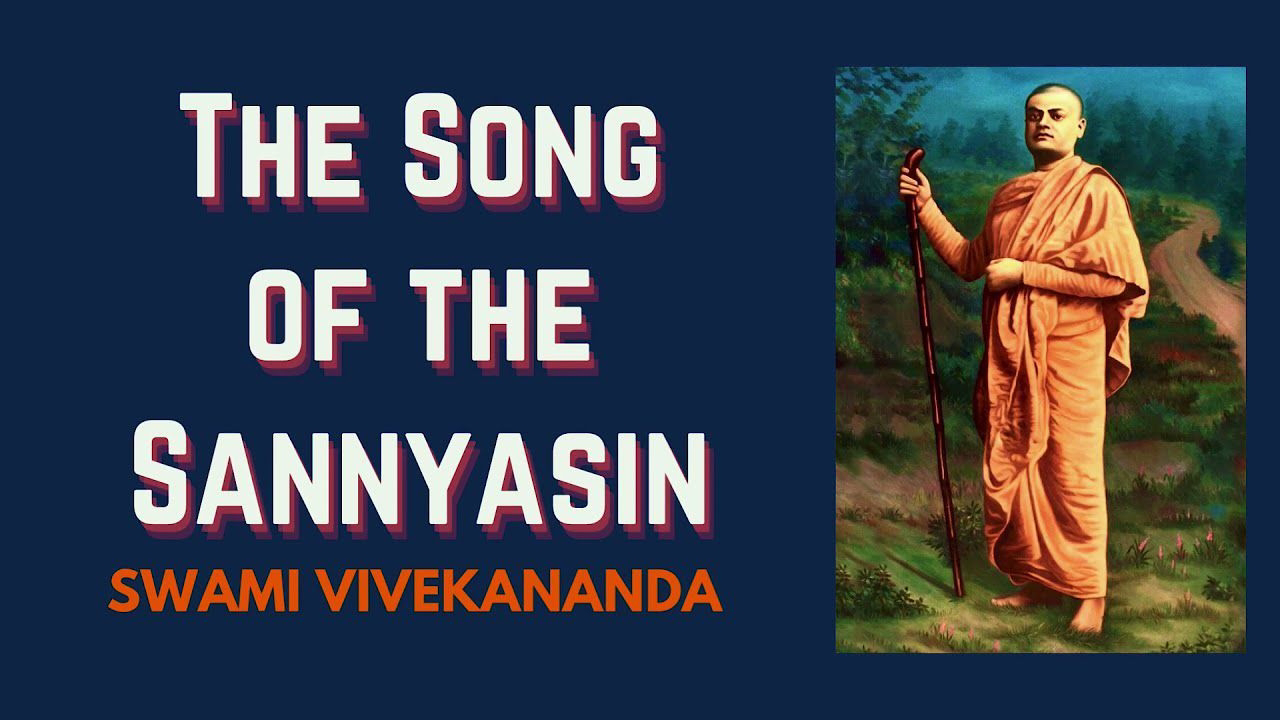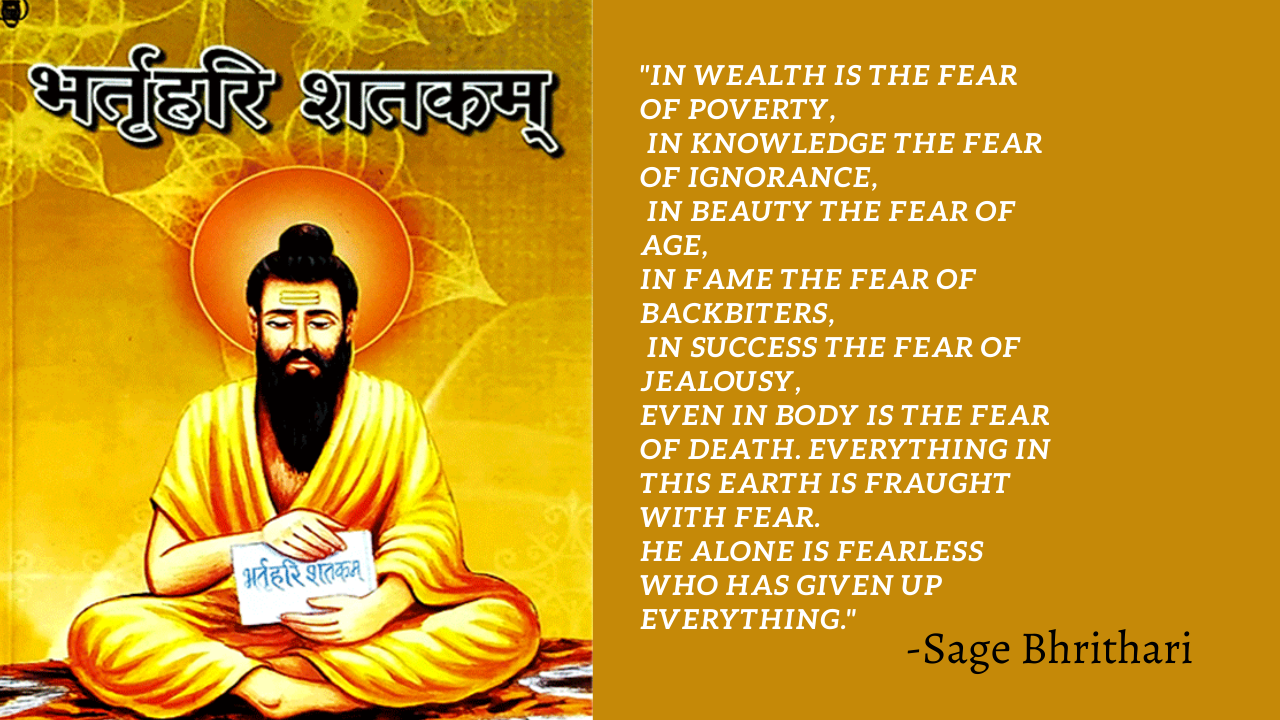The Song of The Sanyassin :- Swami Vivekananda Poetry
"Sisters and brothers of America,
It fills my heart with joy unspeakable to rise in response to the warm and cordial welcome which you've given us.
I thank you in the name of the most ancient order of monks in the world,..."
These were the first sentences uttered by Swami Vivekananda in his first Chicago address.
Notice how he introduces himself - coming from a nation which originated the concept of monkhood.
Friends, be it our ancient Rishis of the Upanishads, or the Vedantin Sanyassins, or the Buddhist Llamas or the Jain Munis - the one common soul of all our religions, is renunciation - tyāg. For me, it is the highest quality ever to be pursuited.
This concept of Sanyassa, as noble as it is, is also one of the most misunderstood concepts.
One of my friends constantly argued with me, "Why should one leave the world and disappear? Isn't that escapism? In that regards, I believe that the householders are more brave than the escapist Sanyassins."
Hearing this remark, I lamented how Tyag has only found itself manifesting in Sanyassins - that too, with such a distortion of the concept.
Instead of writing a blog on my take on Sanyassa, through today's blog, I decided to put forth Swami Vivekananda's idea of Sanyassa - that too, with not boring paragrahps, but a poem Swamiji himself has penned.
Read all the stanzas with proper understanding, and you'll truly find yourself drinking the nectar of India's best gift to the world - Tyaag.
The Song of the Sanyassin
Wake up the note! the song that had its birth
Far off, where worldly taint could never reach,
In mountain caves and glades of forest deep,
Whose calm no sigh for lust or wealth or fame
Could ever dare to break; where rolled the stream
Of knowledge, truth, and bliss that follows both.
Sing high that note, Sannyâsin bold! Say —
"Om Tat Sat, Om!"
Strike off thy fetters! Bonds that bind thee down,
Of shining gold, or darker, baser ore;
Love, hate — good, bad — and all the dual throng,
Know, slave is slave, caressed or whipped, not free;
For fetters, though of gold, are not less strong to bind;
Then off with them, Sannyâsin bold! Say —
"Om Tat Sat, Om!"
Through the first two stanzas, the foremost goal of the seeker is explained. It is FREEDOM. Freedom from wordly fears, anxieties, desires and disappointments.
How is that freedom attained? By the Vedantic realisation of "Om Tat Sat!" - refer to my previous blogs on Vedanta to dwell on that.
Let darkness go; the will-o'-the-wisp that leads
With blinking light to pile more gloom on gloom.
This thirst for life, for ever quench; it drags
From birth to death, and death to birth, the soul.
He conquers all who conquers self. Know this
And never yield, Sannyâsin bold! Say —
"Om Tat Sat, Om!"
"Who sows must reap," they say, "and cause must bring
The sure effect; good, good; bad, bad; and none
Escape the law. But whoso wears a form
Must wear the chain." Too true; but far beyond
Both name and form is Âtman, ever free.
Know thou art That, Sannyâsin bold! Say —
"Om Tat Sat, Om!"
These stanzas unify the message of every religion. Before enjoying the world, we must make sure the world doesn't enjoy us! Conquring the Self - we conquer the world.
They know not truth who dream such vacant dreams
As father, mother, children, wife, and friend.
The sexless Self! whose father He? whose child?
Whose friend, whose foe is He who is but One?
The Self is all in all, none else exists;
And thou art That, Sannyâsin bold! Say —
"Om Tat Sat, Om!"
There is but One — The Free — The Knower — Self!
Without a name, without a form or stain.
In Him is Mâyâ dreaming all this dream.
The witness, He appears as nature, soul.
Know thou art That, Sannyâsin bold! Say —
"Om Tat Sat, Om!"
Where seekest thou? That freedom, friend, this world
Nor that can give. In books and temples vain
Thy search. Thine only is the hand that holds
The rope that drags thee on. Then cease lament,
Let go thy hold, Sannyâsin bold! Say —
"Om Tat Sat, Om!"
Say, "Peace to all: From me no danger be
To aught that lives. In those that dwell on high,
In those that lowly creep, I am the Self in all!
All life both here and there, do I renounce,
All heavens and earths and hells, all hopes and fears."
Thus cut thy bonds, Sannyâsin bold! Say —
"Om Tat Sat, Om!"
Heed then no more how body lives or goes,
Its task is done. Let Karma float it down;
Let one put garlands on, another kick
This frame; say naught. No praise or blame can be
Where praiser praised, and blamer blamed are one.
Thus be thou calm, Sannyâsin bold! Say —
"Om Tat Sat, Om!"
Truth never comes where lust and fame and greed
Of gain reside. No man who thinks of woman
As his wife can ever perfect be;
Nor he who owns the least of things, nor he
Whom anger chains, can ever pass thro' Maya's gates.
So, give these up, Sannyâsin bold! Say —
"Om Tat Sat, Om!"
Have thou no home. What home can hold thee, friend?
The sky thy roof, the grass thy bed; and food
What chance may bring, well cooked or ill, judge not.
No food or drink can taint that noble Self
Which knows Itself. Like rolling river free
Thou ever be, Sannyâsin bold! Say —
"Om Tat Sat, Om!"
Few only know the truth. The rest will hate
And laugh at thee, great one; but pay no heed.
Go thou, the free, from place to place, and help
Them out of darkness, Maya's veil. Without
The fear of pain or search for pleasure, go
Beyond them both, Sannyâsin bold! Say —
"Om Tat Sat, Om!"
Thus, day by day, till Karma's powers spent
Release the soul for ever. No more is birth,
Nor I, nor thou, nor God, nor man. The "I"
Has All become, the All is "I" and Bliss.
Know thou art That, Sannyâsin bold! Say —
"Om Tat Sat, Om!"
Friends, this poem points out what Shri Krishna in the Geeta meant, when he explained Arjuna about Karmayoga and Gyanyoga.
Whoso agrees to the lines written above, and sincerely works to attain it's message, truly seeks Sanyassa.
Thanks,
Daksh Parekh.



Comments
Post a Comment